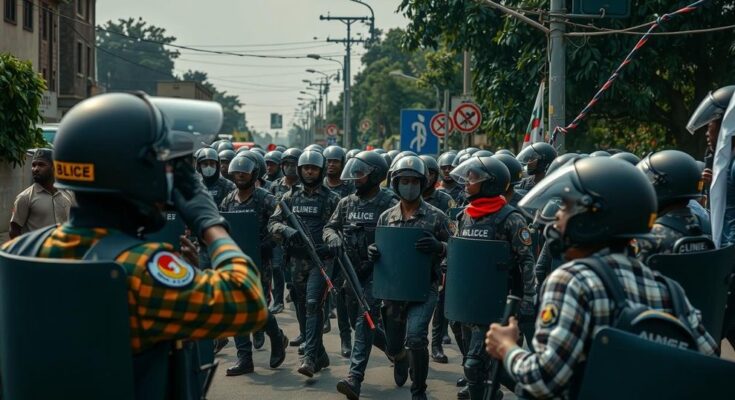Amnesty International reported that the Nigerian police used excessive force during the #Endbadgovernance protests from August 1 to 10, leading to at least 24 deaths. The crackdown involved live ammunition and tear gas against peaceful protesters and resulted in widespread detentions, raising serious concerns over human rights violations and accountability for the police’s actions.
Amnesty International has reported that during the nationwide protests against bad governance in Nigeria from August 1 to August 10, police employed excessive force, resulting in the deaths of at least 24 individuals across several states. The protesters, many of whom were young, were met with violence, including live ammunition fired at close range, leading to serious injuries and fatalities. Victims included two children, further highlighting the tragic outcomes of the demonstrations.
The protests erupted against a backdrop of increasing economic hardship and rampant corruption, drawing attention to the government’s failures. Eyewitness accounts reveal that the demonstrations commenced peacefully but escalated dramatically upon police intervention, which included the indiscriminate use of tear gas and live fire.
Amnesty International emphasizes the necessity for an independent investigation into these incidents, calling for accountability from police and security agencies. The organization condemned the Nigerian authorities for their persistent denial of wrongdoing, despite compelling evidence to the contrary. Isa Sanusi, Director of Amnesty International Nigeria, stated, “The brutal crackdown on the Endbadgovernance is a clear manifestation of Nigerian authorities’ failure to respect the right to freedom of assembly and expression.”
In response to the protests, the authorities engaged in mass detentions, impacting over 1,200 individuals, including minors. Furthermore, many supporters of the initiatives faced harassment on social media and were subsequently arrested. Reports of torture within detention facilities indicate a broader pattern of human rights violations associated with the government’s response to dissent.
International legal standards dictate that police should not use deadly force in dispersing protests unless there is an imminent threat to life. The recurrence of lethal force highlights the urgent need for reform within the Nigerian security apparatus to align with both national and international standards regarding the treatment of protesters.
There is a critical demand for justice for victims of police violence and an end to the cycle of impunity that has characterized the Nigerian government’s approach to peaceful protest. The international community and human rights organizations are calling upon the Nigerian authorities to ensure accountability and uphold the fundamental rights of assembly and expression.
The #Endbadgovernance protests in Nigeria arose from widespread discontent with rising living costs and pervasive corruption. Organized between August 1 and August 10, these demonstrations attracted significant public engagement across multiple states. However, what began as peaceful gatherings quickly devolved into violent confrontations with security forces, leading to numerous casualties and extensive detention of protesters. The heavy-handed tactics employed by the police have drawn national and international scrutiny, prompting calls for investigations into human rights violations. The response reflects a broader trend within Nigeria regarding the treatment of dissent and the need for accountability within law enforcement agencies.
The violent suppression of the #Endbadgovernance protests in Nigeria illustrates a grave violation of human rights, marked by excessive police force and a blatant disregard for the rule of law. With at least 24 fatalities and over 1,200 arrests, the Nigerian authorities face compelling calls for accountability and reform. The international community must monitor the situation closely and demand that the Nigerian government adheres to its domestic and international obligations regarding human rights. Ultimately, the preservation of peaceful assembly and expression is crucial for the health of Nigeria’s democracy.
Original Source: www.amnesty.org




